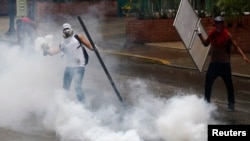Venezuelan security forces on Thursday rounded up hundreds of youth activists and dismantled camps set up as part of protests against President Nicolas Maduro, leading angry residents to stage demonstrations in backlash against the move.
Pre-dawn raids by National Guard troops broke up four tent camps maintained by student activists as part of a three-month wave of protests that have steadily waned over recent weeks even as sporadic clashes continue.
Police fired tear gas on protesters near the upscale Plaza Altamira who had set up barricades along a main avenue in eastern Caracas to demand the students be freed.
Earlier, a man used a pipe to break the windshield and windows of a truck that tried to push through barricades.
"These arrests are irresponsible because this is a peaceful protest and we are not trying to topple the government," said Jose Manuel Perez, 22, a student leader. "Mr. President, think about what you're doing. We demand respect for the students."
Troops on Thursday morning picked up the remnants of the camps, where students from all over the country had lived in tents, chatting and strumming guitars beneath banners with anti-government slogans, such as "Maduro, assassin."
Interior Minister Miguel Rodriguez said soldiers arrested 243 people, accusing the students of using the camps as a base of operations to stage violent protests. He displayed items taken during the raids including mortars and Molotov cocktails.
The near-daily protests of February and March, which saw clouds of tear gas and barricades of burning trash and tires, have waned as opposition sympathizers have taken stock that Maduro is unlikely to be pushed from office.
Sporadic acts of violence have continued, including the burning of a National Guard vehicle this week.
Forty-one people have been killed, according to official figures, and nearly 800 injured. About 3,000 people have been arrested since February, with Thursday's latest round-up leaving about 450 people still in detention.
Francia Cacique, 24, a leader of one of the camps, called the raid illegal and denied the students had been plotting subversive activities.
"They've come up with the excuse of drugs and weapons, which is totally false," Cacique told Reuters via cellphone instant message, saying the detained protesters were being held at a Caracas military base. She was not arrested.
"I call on the world to help us and to realize that this is a dictatorship!"
Opposition demonstrators took to the streets in February to demand Maduro's resignation, complaining of soaring prices, chronic product shortages and abuse by security forces.
Maduro has called the protests an effort to overthrow him through public order disruptions that have snarled traffic, preventing some people from obtaining medical treatment.
Pre-dawn raids by National Guard troops broke up four tent camps maintained by student activists as part of a three-month wave of protests that have steadily waned over recent weeks even as sporadic clashes continue.
Police fired tear gas on protesters near the upscale Plaza Altamira who had set up barricades along a main avenue in eastern Caracas to demand the students be freed.
Earlier, a man used a pipe to break the windshield and windows of a truck that tried to push through barricades.
"These arrests are irresponsible because this is a peaceful protest and we are not trying to topple the government," said Jose Manuel Perez, 22, a student leader. "Mr. President, think about what you're doing. We demand respect for the students."
Troops on Thursday morning picked up the remnants of the camps, where students from all over the country had lived in tents, chatting and strumming guitars beneath banners with anti-government slogans, such as "Maduro, assassin."
Interior Minister Miguel Rodriguez said soldiers arrested 243 people, accusing the students of using the camps as a base of operations to stage violent protests. He displayed items taken during the raids including mortars and Molotov cocktails.
The near-daily protests of February and March, which saw clouds of tear gas and barricades of burning trash and tires, have waned as opposition sympathizers have taken stock that Maduro is unlikely to be pushed from office.
Sporadic acts of violence have continued, including the burning of a National Guard vehicle this week.
Forty-one people have been killed, according to official figures, and nearly 800 injured. About 3,000 people have been arrested since February, with Thursday's latest round-up leaving about 450 people still in detention.
Francia Cacique, 24, a leader of one of the camps, called the raid illegal and denied the students had been plotting subversive activities.
"They've come up with the excuse of drugs and weapons, which is totally false," Cacique told Reuters via cellphone instant message, saying the detained protesters were being held at a Caracas military base. She was not arrested.
"I call on the world to help us and to realize that this is a dictatorship!"
Opposition demonstrators took to the streets in February to demand Maduro's resignation, complaining of soaring prices, chronic product shortages and abuse by security forces.
Maduro has called the protests an effort to overthrow him through public order disruptions that have snarled traffic, preventing some people from obtaining medical treatment.





